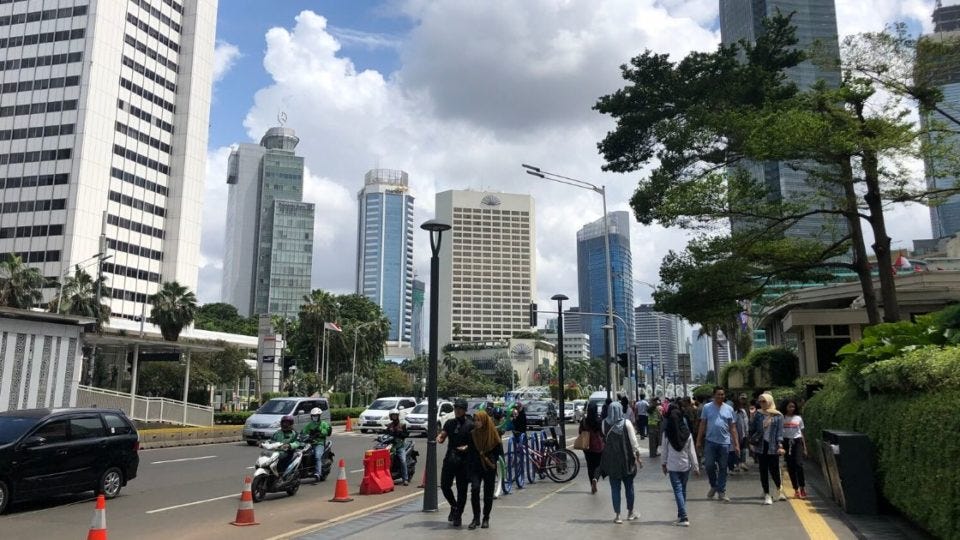Hello Coconauts!
This week’s edition is free to read for all. If you like what you see, be sure to take advantage of our Ramadan Special, which entitles you to a 30-day free trial. Sign up now — offer ends May 12!
Now, let’s get into the nitty-gritty of all the crucial happenings in Indonesia, where the week’s highlights included some of the gravest breaches of COVID-19 protocols and a criminal case centering on a shapeshifting boar demon thief.
Enjoy, and we’ll see you next week!
Business and the economy
High growth imminent
The Asian Development Bank (ADB) has projected a return to high growth for Indonesia in 2022, with the economy forecast to expand 5 percent following a 4.5 percent growth this year.
ADB said Indonesia will leave recession behind this year on the back of a sustainable trade recovery, a revival in the manufacturing sector, and increased household spending.
ADB’s projection is a little more optimistic than that of Bank Indonesia (BI), which last week downgraded the country’s growth projection for 2021 from 4.8-5.8 percent to 4.1-5.1 percent due to longer than expected pandemic disruptions.
Mini reshuffle
President Joko Widodo has announced the formation of a new Investment Ministry, headed by Investment Coordinating Board chief Bahlil Lahadalia, who has been tasked with luring investment into the country and creating jobs.
In addition, the president merged the Education and Culture Ministry with the Research and Technology Ministry, which is headed by former Gojek CEO Nadiem Makarim, as well as made key appointments in agencies related to science and innovation.
Billions in digital
Indonesia Finance Minister Sri Mulyani Indrawati talked up the country’s massive digital economy potential, which, studies show, may be a US$124 billion industry by 2025, up from US$44 billion in 2020.
A key to realizing that potential, the minister said, is for the government to continue developing the country’s digital infrastructure, including broadening the scope of reliable internet nationwide.
Tax freeze fuels sales
Indonesia’s auto sector posted a 73 percent month-on-month increase for sales of new vehicles in March, largely attributed to the government’s luxury tax freeze on small vehicles. The pandemic-battered industry predicts that the policy may help boost sales this year by 11 percent.
Under the scheme, the 10 percent luxury tax on vehicles has been waived entirely from March to May, and will be reduced by half from June to August and by a quarter from September to November.
There are concerns that the growth would be unsustainable beyond the tax freeze period, and the Indonesian government has been urged to focus on boosting automotive exports.
Greener pastures
Indonesia and the UK have agreed to strengthen their US$4.18 billion trade and investment links with a new joint trade dialogue, which will open green energy opportunities for UK companies in Southeast Asia’s largest economy.
British Petroleum (BP) is already evaluating an ambitious carbon capture storage and reinjection scheme pending the passing of local regulations.
Recommended read
Farming pot abroad: The Indonesians living overseas as marijuana farmers (The Jakarta Post)
Indonesia, Rom said, needs to study what fields will benefit from a marijuana industry. Like many other supporters of marijuana legalization in the country, he believes that with the right knowledge, education, policies and rule enforcement, Indonesia can take this step.
Across the archipelago
One swab, multiple nostrils
Police in Medan, North Sumatra have arrested employees at an airport lab who were caught reusing cotton swabs for COVID-19 testing mandatory for travel. By the police’s estimate, the lab workers shoved reused cotton swabs up the nostrils of some 9,000 people in the three months they carried out the crime.
Police said the lab workers washed and repackaged cotton swabs when they were supposed to be discarded after use in order to cut costs. Those who were in on the scheme reportedly pocketed IDR1.8 billion (US$124,533).
The suspects may each face up to 15 years in prison and fined IDR3 billion (US$207,576). The police have not determined whether or not any of the 9,000 were infected with COVID-19 via the reused swabs.
Quarantine ‘mafia’
Meanwhile, the Jakarta Metro Police says it’s focusing efforts on uncovering a crime syndicate that is likely aiding international travelers skirt mandatory hotel quarantine for a fee.
Police have so far arrested one Indonesian traveler and three people with connections to quarantine operations at the airport and designated hotels after the former bribed the latter IDR6.5 million (US$448.39) to skip the 14-day mandatory hotel isolation for returnees from India.
Two of the bribe recipients carried ID badges belonging to the city’s tourism agency, though the agency has denied any links with them. Police have yet to reveal whether or not they’re employed by the government.
Papua conflict escalates
Indonesia has officially designated the West Papua National Liberation Army, an armed separatist group in far east of the archipelago, as a terrorist organization amid years of violence in the region.
The decision came after an Indonesian general was killed in a rebel ambush, prompting President Jokowi to order defense officials to wipe the region clean of armed rebels. Separatist leader Benny Wenda to point out that it’s Indonesia that has illegally invaded the region for nearly 60 years, carrying out a slow genocide that has killed over 500,000 people.
On eternal patrol
Search and rescuers located the sunken KRI Nanggala-402 on Saturday after contact with the submarine was lost last Wednesday. The wreckage of the submarine, broken into three pieces, was located on Saturday at a depth of 838 meters, and all 53 crew on board were declared dead.
Authorities have yet to determine the cause of the incident.
Myanmar summit
Jakarta on Saturday hosted the first international effort to address the political and humanitarian crisis in Myanmar following a military coup in February and deadly crackdown in the country. All 10 ASEAN member states reached a consensus on five points in the regional summit, including calling on the Myanmar military to stop killing protesters and release political prisoners.
The consensus was welcomed by Myanmar’s parallel government, the National Unity Government (NUG), which may be the first step towards the restoration of democracy in the country.
FPI boss nabbed
The National Police’s Densus 88 counterterrorism squad arrested the former secretary general of the disbanded Islamic Defenders Front (FPI) Munarman, who has been accused of involvement in recent terror acts in the country.
Munarman is facing life imprisonment for conspiracy to commit terror acts in Indonesia. Police also say they seized explosive materials while raiding his South Tangerang home.
FPI founder and former leader Rizieq Shihab, who last year returned from exile in Saudi Arabia to escape charges related to pornography, is currently in trial for incitement related to mass gatherings held in his honor despite the ongoing pandemic.
The babi ngepet saga
A local religious leader in a village in Depok, West Java has been charged with causing public disorder using fake news after he made up a story about a babi ngepet (In Indonesian mythology, a shapeshifting wild boar demon thief) stealing villagers’ money and belongings.
The villagers initially bought the cleric’s story, and a dozen men stripped naked to be able to see the creature and capture it. They then beheaded and buried the boar in two graves in a public ceremony, highlighting that supernatural traditions still run deep in many areas in Indonesia.
Police later exhumed the graves and found that they contained the remains of an ordinary wild boar, which the cleric confessed to buying to be turned into a scapegoat for the hard economic times the village is suffering. The cleric may face up to 10 years in prison for the elaborate lie.
Recommended reads
Indonesia raises ASEAN’s bar on Myanmar (The Interpreter)
So it was a welcome surprise to see Jokowi, as he is known, seizing the initiative on Myanmar, corralling fellow ASEAN leaders to meet at a special summit in Jakarta at the weekend. In the midst of the pandemic and Indonesia’s first recession since the Asian financial crisis, Jokowi had nothing to gain in domestic political terms from his call for action on Myanmar.
In response to these challenges, the regime initiated measures to suppress the extremist groups via a state-led initiative of bolstering the Islamic credentials of moderate groups. However, many observers considered that these measures undermined the freedom of expression of Islamists and other dissenters alike. The measures are also perceived to have led to a regression in Indonesia’s progress towards further democratization.
“[Hani] was buried like an animal,” Damayanti recalled, her voice trembling. “Put inside a knee-deep grave, with only a wooden headstone. Without a name, just identification numbers.” She wondered aloud, “Just because we don’t own ID cards, does that mean we can be buried like this?”
Top Coconuts Jakarta stories this week
Indonesian traveler paid IDR6.5 million to skip quarantine after return from India: police
A Muslim influencer complained about a loud mosque, and it went as well as anybody could’ve hoped
Depok villagers behead ‘babi ngepet’ shapeshifting boar demon accused of stealing money
Mad Grass, Jakarta’s first plant-based cloud kitchen, is now open
Indonesian lab workers arrested as police find reused test kits
Top Coconuts Bali stories this week






